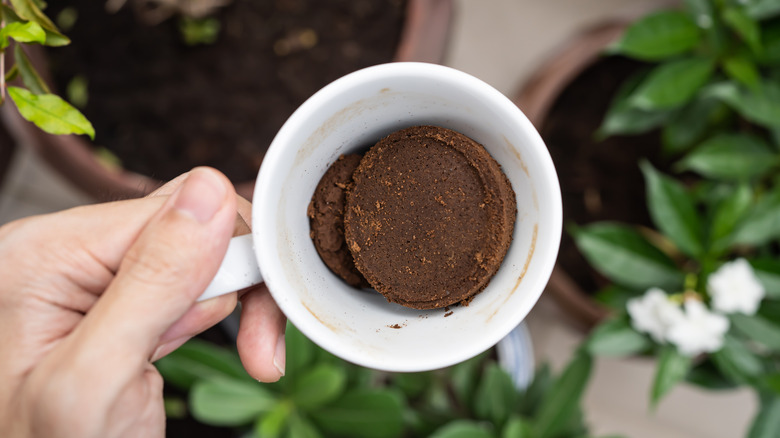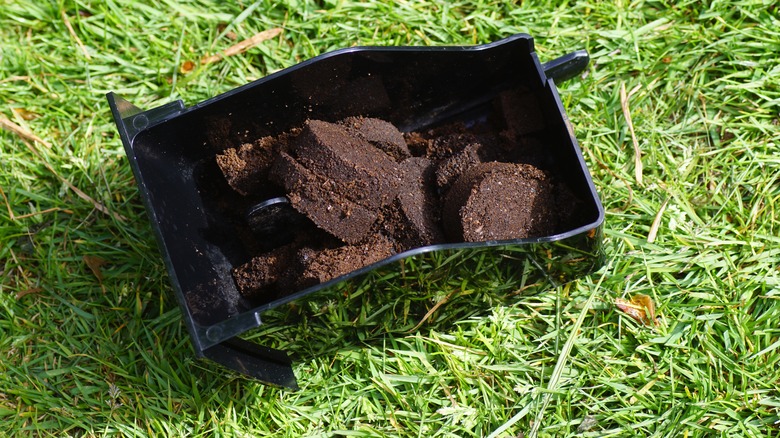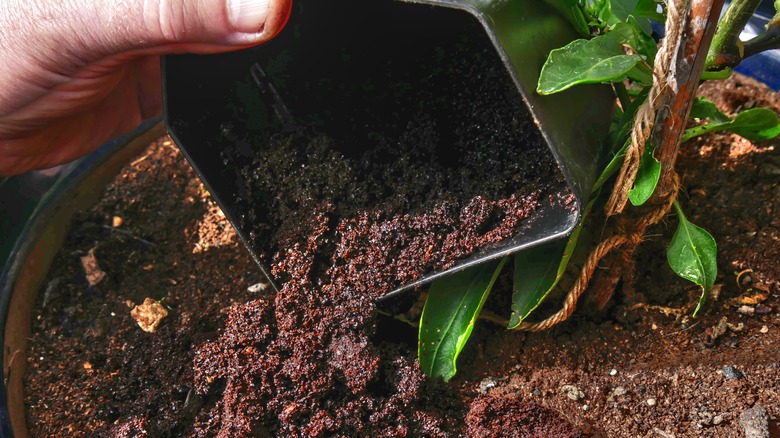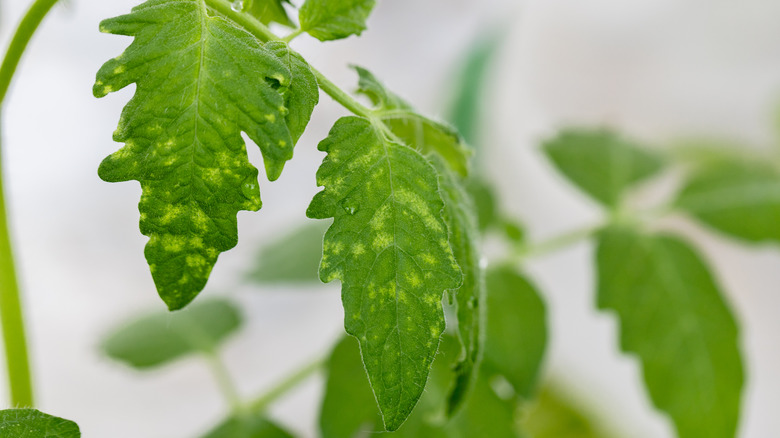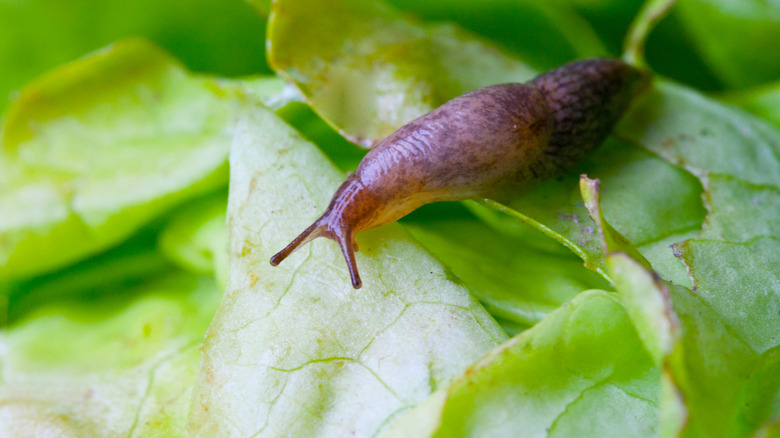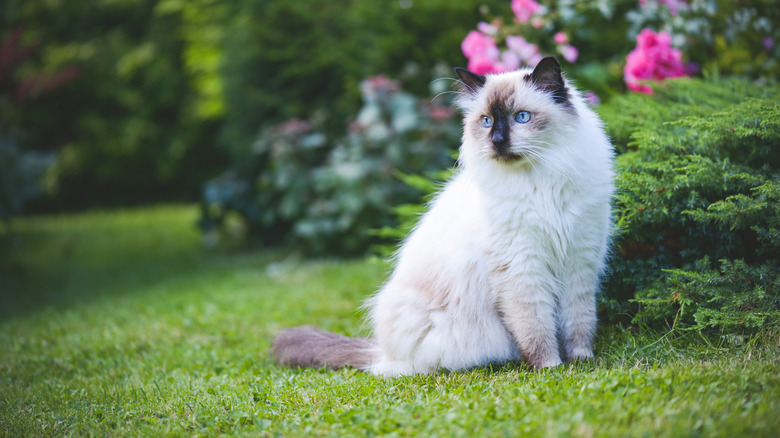Genius Ways To Use Leftover Coffee Grounds In Your Yard & Garden
Achieving a healthy yard is arguably one of the most important aspects of home maintenance. Not only is it aesthetically appealing to have a green yard and a thriving garden, but lush grass is also more comfortable for your family to spend time on than a balding lawn, and plants can be helpful for the environment while providing food, flowers, privacy-inducing foliage, and more. Whether you currently have a verdant yard and want to keep it that way, or you're trying to bring some life back to your grass and plants, you might want to consider natural methods that leverage everyday items from your own kitchen. One much talked about method is used coffee grounds.
You may have already tried out some of the different uses for coffee grounds around your home. When it comes to your yard and garden, it's thought that leftover coffee grounds can effectively work as a natural fertilizer, keeping both your grass and garden plants growing strong. On top of this, coffee grounds may have other purported benefits, such as warding off certain pests and helping to prevent fungal diseases in the soil. At the same time, there are some things to avoid when using coffee grounds in the garden, such as mulching with overly thick layers, or overloading your compost pile with grounds. To use coffee grounds to your advantage in the garden, keep reading and learn all the dos and don'ts associated with this common kitchen waste product.
Including coffee grounds in a top dressing may help produce a healthier lawn
Commercial fertilizers are certainly one option for achieving lush green grass, but you may also be able to go a more natural route by putting coffee grounds on your lawn. While both coffee and store-bought fertilizers contain important ingredients, such as nitrogen, potassium, and phosphorus, coffee has a slight edge because it also offers calcium, magnesium, and copper. Unlike liquid fertilizer, coffee grounds also add organic matter to the soil. According to Ben Wherley, Ph.D, a turfgrass ecologist at Texas A&M University, investigations show that coffee grounds have boosted the health of household lawns, as well as commercial grassy areas, such as golf courses and sports fields.
For lawn care, coffee grounds may be mixed into soil or compost and used as a top dressing. You can also simply sprinkle the grounds over your grass and water them, but be sure not to apply an overly thick layer, as this can dry out into a hard cake. Composting your coffee grounds before using them as a lawn dressing ensures this won't happen, and it could also be best if you're growing a lawn from seed. According to the University of Arizona, studies have shown coffee grounds to have widely varying effects on seedlings, encouraging germination and growth in some plant species, and discouraging it in others.
While this yard hack may be effective, it's also possible to use too much coffee. For example, when incorporating coffee grounds into compost heaps, Washington State University recommends adding no more than 20% of the total volume. Also, Texas A&M found the full benefits of coffee grounds on lawns were achieved when used as a supplement to other commercial fertilizers.
Fertilizing with coffee grounds could help support plant growth
The same nutrients in coffee grounds that support grass growth can also help other plants in your garden. Not only can spent grounds act as a natural fertilizer, but they can also help feed beneficial soil microbes and improve the overall structure of the soil. This in turn can promote better drainage so that your plants don't suffer from waterlogging. More research is needed on the effects of coffee grounds on specific plant types, but as a soil amendment they may be most helpful for cabbage and sugar beets, as well as soybeans. There's also anecdotal evidence that used coffee grounds may help tomato plants.
To use coffee grounds for garden plants, Oregon State University recommends adding a ½-inch layer into your soil, lightly spading it into the top 4 inches of ground. You can use coffee grounds as a mulching material, but you may want to mix it with leaves or cover with other types of mulch (like wood chips) to prevent the grounds from drying out and creating a hard layer through which water will struggle to penetrate. As with lawn care, coffee grounds may help in a supportive role, and should not be the only item you amend with for plant growth. Furthermore, you should not use coffee grounds with the expectation that they will fix overly alkaline soils and decrease the pH for your plants. According to the University of Maine, used coffee grounds have a more neutral pH between 6.5 and 6.8, and will therefore likely have little to no effect on soil pH.
Used coffee grounds may also combat certain plant diseases
If you're like most gardeners and have dealt with plant diseases and rot from time to time, the addition of leftover coffee grounds might potentially alleviate this problem. According to the University of Arizona, coffee grounds seem to inhibit certain bacterial and fungal diseases within the soil, such as white mold (Sclerotinia), Pythium (causes damping off), and Fusarium. An article published by the University of Wyoming suggests that coffee may protect tomato plants, eggplants, peppers, and potatoes, from these hard-to-beat fungal diseases. On top of this, coffee grounds can be a food source for earthworms. Earthworms are famous for their ability to improve soil, which might also help prevent plant diseases.
To stop common diseases from taking hold of your plants, simply add your spent coffee grounds to the compost heap. You can also apply coffee grounds directly to the soil, as discussed above, making sure to either work it in, mix with other mulch materials, or cover with a layer of loose mulch like hay or bark chips. If you continue to experience plant rot or wilt issues, consider investigating other potential hidden dangers that are ruining your garden, such as overwatering.
Coffee could be surprisingly effective against slugs
Certain organisms may thrive on coffee grounds, but slugs reportedly do not. In fact, it's thought that slugs who are exposed to brewed coffee grounds may succumb to caffeine poisoning, and in some cases, the hack may work just as well (if not better) than commercial slug products. Also, using coffee grounds for natural pest control can help your plants out in the process, too.
According to Oregon State University, research suggests that using a solution of one part water to two parts brewed coffee may help kill slugs that live in the soil around your plants. They also recommend creating a coffee spray to help target slugs eating foliage in the garden. For this method though, you need to weaken the coffee a bit more, so the acidity doesn't damage your plants. The recommended ratio is nine parts water to every one part of coffee. To make sure your plants can withstand the coffee-containing spray, you can test a small amount on a few leaves and wait to see whether they suffer any damage after being exposed to the sun.
Cats may steer clear of coffee grounds in your garden
While seeing an occasional stray cat in your garden isn't automatically harmful, they do have the potential to use yard areas to do their business instead of a litter box, which can contaminate the soil and pose serious human health risks. It can be difficult controlling cats in your neighborhood, and even if they don't use your garden as a toilet, they may be tempted to roll in beds of new seedlings, upset planter trays, and get up to other cat-typical mischief. The same applies to your own cat if they go outside from time to time. You can't always control where a cat will go, but you may be able to help deter them from your yard and garden with repelling scents. One example is coffee grounds, which purportedly works to prevent cats from doing damage because they don't like the smell. It's thought that either dry or wet coffee grounds are aromatic enough to do the trick.
However, it's important to keep in mind that this leftover coffee ground hack is based on anecdotal evidence only. The same applies to other "natural" aromatic cat-deterring methods, such as using cinnamon, cloves, and garlic. Not only is there a lack of scientific evidence to support these methods, another potential problem is that these substances would need to be applied relatively often to work. Furthermore, coffee in moderate to large amounts can be harmful to both cats and dogs if they accidentally ingest it.
